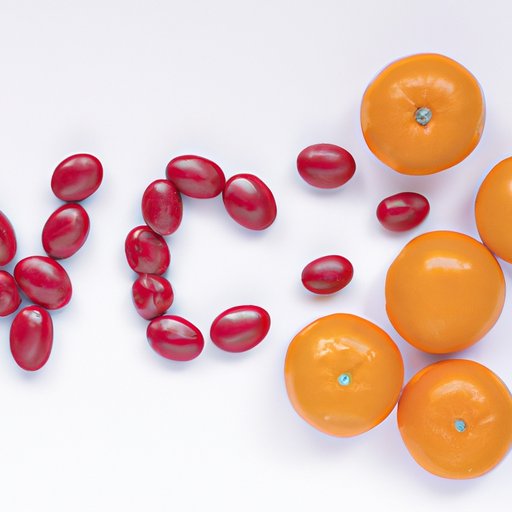
I. Introduction
When it comes to maintaining our health, many of us often forget about our eyes and their care. However, taking care of our eyes is just as important as taking care of any other part of our body. Vitamins are essential nutrients that play a vital role in maintaining our eye health, protecting our eyes from damage, reducing the risk of eye-related issues, and improving our vision. This article will delve into the benefits of different vitamins for eye health – vitamin A, vitamin C, vitamin E, and vitamin D, and other essential nutrients for eyesight and overall health.
II. The Role of Vitamin A in Maintaining Eye Health
Vitamin A is an essential nutrient that is required by the body to maintain and improve vision, particularly in dim light conditions. It functions in the formation and maintenance of the cells of the eye, and also helps reduce the risk of age-related macular degeneration (AMD).
Foods rich in vitamin A include – liver, egg yolks, cod liver oil, sweet potatoes, carrots, spinach, kale, and broccoli. If you’re unable to get the required amount of vitamin A through your diet, taking vitamin A supplements is another option to consider.
III. How Vitamin C Can Benefit Your Vision
Vitamin C is another vital nutrient that plays an important role in maintaining eye health. Vitamin C is a powerful antioxidant that helps protect the eyes from damaging free radicals, reduces the risk of cataracts and AMD, and improves the overall health of the eyes.
Foods that are rich in vitamin C include – citrus fruits (lemon, lime, oranges, and grapefruit), kiwi, strawberries, bell peppers, and broccoli. If your diet is deficient in vitamin C, consider taking a vitamin C supplement to benefit your eyes, skin, and overall health.
IV. Vitamin E: A Powerful Antioxidant for Eye Protection
Vitamin E is another essential nutrient for eye health that helps protect the eyes from age-related damage. It functions as a powerful antioxidant, protecting the cells in the eyes from oxidative stress and reducing the risk of cataracts and AMD.
Foods rich in vitamin E include – almonds, peanuts, sunflower seeds, wheat germ, and vegetable oils (such as sunflower, safflower, and soybean oils). Vitamin E supplements can also be included in your diet if you need to boost your intake.
V. The Benefits of Vitamin D for Eye Health and Function
Vitamin D is an essential vitamin that is not only beneficial for the health of our bones, but also for our eyes. It helps reduce the risk of age-related macular degeneration and improves the overall function of the eyes.
Foods that are rich in vitamin D include – fatty fish (salmon, tuna, and sardines), egg yolks, and cheese. However, the best source of vitamin D is sunlight. If you’re concerned about your vitamin D levels, consider taking a vitamin D supplement after consulting with your healthcare provider.
VI. Other Vitamins and Nutrients to Consider
While the above-mentioned vitamins are crucial for maintaining and improving eye health, there are other essential vitamins and nutrients that you should also consider. These include zinc, omega-3 fatty acids, and lutein and zeaxanthin.
Foods that are rich in zinc include – oysters, beef, and pork. Rich sources of omega-3 fatty acids are fatty fish such as salmon, tuna, and mackerel. Lutein and zeaxanthin can be found in green, leafy vegetables such as spinach, kale, and collard greens, as well as in eggs.
VII. Conclusion
Vitamins play a crucial role in maintaining and improving our eye health. Vitamin A, vitamin C, vitamin E, and vitamin D are essential for eye health, protecting our eyes from damage, reducing the risk of age-related issues, and improving overall eyesight.
It’s important to incorporate vitamin-rich foods into our diet, and consider taking supplements if our intake is below the recommended amount. Other vitamins and nutrients like zinc, omega-3 fatty acids, and lutein and zeaxanthin should also be included in our diet to improve our eye health and overall well-being. Remember to prioritize your eye health by taking the necessary steps to keep your eyes healthy and functioning optimally.





